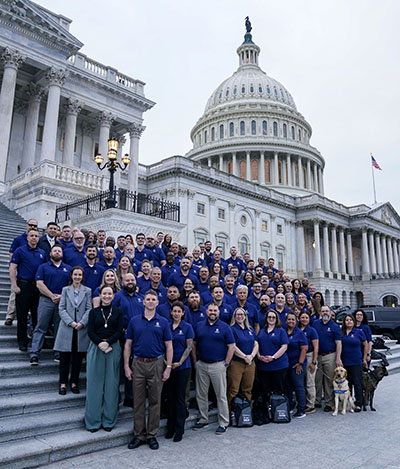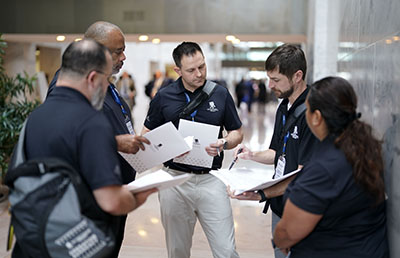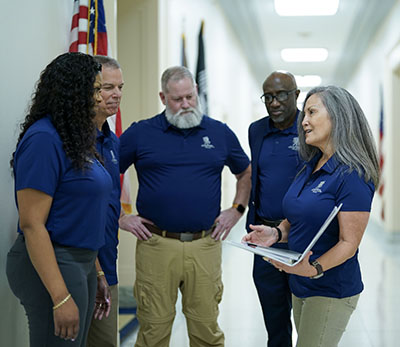The Role of Advocacy in Addressing Veterans’ Issues

Warriors Help Lead the Charge for Wounded Warrior Project’s Legislative Priorities
Advocating legislatively on veterans’ issues is not just a matter of honoring the sacrifice veterans make; it's a crucial step toward fulfilling a national promise to care for those who fight for us. Pushing for policies and support programs helps ensure that those who have served our country receive the care and opportunities they’ve rightfully earned.
Wounded Warrior Project® (WWP) advocates for legislative initiatives that make a difference in the lives of veterans and their families. WWP’s™ grassroots advocacy efforts play an integral component in this work, giving warriors the opportunity to use their voices to directly influence public policy changes.
Warriors Championing Change
Warriors are the reason WWP exists. Their insights help prioritize WWP’s advocacy efforts and their unique perspectives allow them to advocate effectively for policies addressing mental health, financial security, toxic exposure, and suicide prevention.
“Warriors have firsthand experience with the challenges and needs faced by post-9/11 veterans,” said Justin Beland, Grassroots and Constituent Affairs director for WWP. “By sharing their experiences, they can ensure that the specific needs of warriors are heard and addressed. Their involvement can help policymakers understand the real-world implications of proposed policies and ensure that legislation and programs effectively address the needs of warriors.”
Currently, one of WWP’s legislative priorities is the passage of the Major Richard Star Act, which would provide both disability compensation and retirement pay simultaneously for retirees with fewer than 20 years of service and a combat-related disability.
WWP warriors from across the U.S. gathered in Washington, DC in March 2024 to meet with members of Congress and discuss their experiences. Those meetings led to two senators signing on as co-sponsors of important bills that WWP is advocating for, including the Major Richard Star Act.
All warriors are encouraged to send a message to Congress, urging them to pass the Major Richard Star Act now. You can quickly personalize and send a message here!
"Participating as a veteran advocate is one of the most empowering ways a warrior can help affect change within our community,” warrior and Army veteran Anton Harb Jr. said. “Veterans of all eras have struggled with homelessness, substance abuse, lack of mental health care, and financial instability. A warrior's service to the country does not end when we take off our uniform. Advocating and insisting our decision-makers work toward a better quality of life for all veterans is part of the foundation of what this nation rests upon.”
How to Advocate for Veteran Issues

One of the most powerful ways to make legislative change that benefits warriors is urging Congress to pass bills that impact the lives of veteran families.
Justin offers these tips to help you harness the power of your voice when it comes to reaching out to members of Congress.
- Know your members of Congress. Don’t just know their names; check their websites, read their bios, and see the issues they focus on. You may find similar interests or connections you can use as you communicate.
- You don’t have to be a policy expert. Don’t worry if you don’t know all the details about a bill. What you need to know is how it will affect you and your fellow warriors. Members of Congress aren’t looking to you as a policy expert; they want to hear about your experiences.
- Personalize the letter – storytelling is critical. Members of Congress want stories about how legislation will affect their constituents. Take the time to personalize your letter and express how a bill will impact you and the veteran community.
- Follow up. Congressional offices get thousands of messages a day. You can stand out by following up a week or two later. Call their office, ask to speak to the legislative staffer handling veterans’ issues, and talk briefly about the bill and its impact.
- Be polite, professional, concise, and stick to the issue. You may not agree with your Congressperson on all issues. You might vote against them in an election. But when lobbying for a bill, you’re trying to persuade them to support your priorities. Focus on the bigger picture - supporting the warrior community.
| BE A VOICE FOR VETERANS |
|
Use WWP’s online Grassroots Advocacy System to help compose an email to your congressional members.
It’s that simple! |
Upcoming Legislative Priorities
WWP is focused on championing legislative priorities critical to the well-being and empowerment of veterans and their families.
Some of the current bills to take action on include:
- The Major Richard Star Act: This bill would provide both disability compensation and retirement pay simultaneously for retirees with fewer than 20 years of service and a combat-related disability.
- The Autonomy for Disabled Veterans Act: This bill would increase the amount available to disabled veterans for improvements and structural alterations to their homes related to their disability.
- The DRIVE Act: This bill would increase the reimbursement rates for veterans driving to the VA to reflect inflation rates.
- The VET PFAS Act: This bill would Provide health care and benefits for veterans and their families who were exposed to toxic PFAS chemicals on military bases.
Track the status of key veterans legislation through WWP
Policy Wins for Veterans
As WWP has grown in serving wounded warriors, so have its advocacy efforts. WWP has helped achieve some significant public policy wins affecting veterans, family members, and caregivers. These include:
- The SFC Heath Robinson Honoring our PACT Act: This groundbreaking legislation was signed into law on Aug. 10, 2022, and extends eligibility to VA health care and benefits to veterans who suffer from illnesses related to exposure to burn pits and other toxic substances during service. It added more than 20 categories of new presumptive conditions related to burn pits and other toxins. Find out more about the PACT Act.
- Ryan Kules and Paul Benne Specially Adaptive Housing Improvement Act: Named for Army Cpt. Ryan Kules, the director of Project Odyssey at WWP, and retired Army Col. Paul Benne, who passed away in 2019, the new law made the specially adapted housing (SAH) grant available to four times as many veterans in a given year, doubled the number of times a veteran can receive the SAH grant throughout their lifetime; and increased the lifetime value of the grants by approximately $14,000.
- Deborah Sampson Act: Named for an indentured servant who posed as a man to join the Continental Army in 1782, this bill implements or expands various programs related to health care and benefits for women veterans at VA. It also requires VA to take steps to end harassment and sexual assault and ensure equality and safety at VA facilities.
- Brian Neuman/Mark O’Brien Clothing Allowance Improvement Act: Named for two severely wounded combat veterans, including warrior and WWP Complex Case Coordination senior operations specialist Brian Neuman, this bill helped streamline the VA clothing allowance process for severely injured veterans. It helped remove some of the burdens of continuously filing for VA’s clothing allowance annually for veterans who may have lifelong injuries.
- Executive Order 14095 to Increase Access to High-Quality Care and Supporting Caregivers: The order, signed into law on April 18, 2023, included several initiatives that aim to improve access to home-based care for veterans who require daily support and give them more decision-making power in how, when, and by whom their care is delivered.
The Power of Voice

Advocating on issues impacting veterans helps lawmakers understand the personal and real effects of military service. It also allows warriors to do something they’re familiar with – serving others.
"As I continue to grow in my recovery, I strongly feel a responsibility to advocate for others who felt and feel how I did so they can move away from feeling alone or misunderstood and feel courage regarding their recovery journey, whatever that may look like for them,” said warrior and Army veteran Connie Johnson. “I stayed in a state of isolation for years because I didn't speak up for myself, and now, I want to speak on behalf of others.
“Being involved in the Wounded Warrior Project advocacy program gives me a reliable platform with other like-minded veterans to advocate for those who are still silent and to share how the weight of our injuries is a part of who we have become, and we will carry that weight for as long as we live.”
Contact: — Paris Moulden, Public Relations, pmoulden@woundedwarriorproject.org, 904.570.7910
About Wounded Warrior Project
Since 2003, Wounded Warrior Project® (WWP) has been meeting the growing needs of warriors, their families, and caregivers — helping them achieve their highest ambition. Learn more.